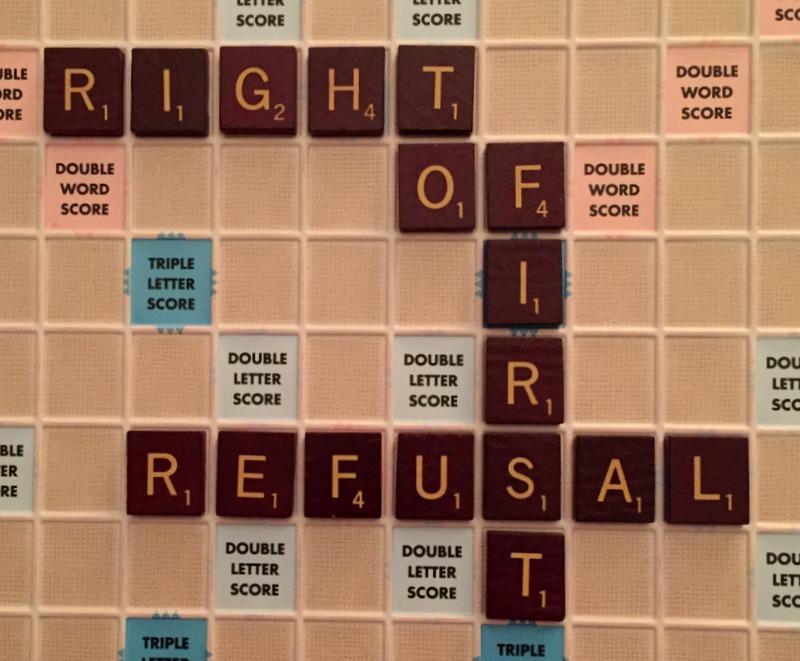 Reader Question: My wife and I own a large tract of land. We want to sell off a one hundred acre parcel. We have a written offer-to-purchase that has been in negotiation for over ninety days. The buyer wants a “right-of-first-refusal (ROFR) should we sell off more land in the future. The offer contains a contingency that states, “ Buyer has the right-of-first-refusal to purchase an additional one hundred acres if and when the seller sells additional property.”
Reader Question: My wife and I own a large tract of land. We want to sell off a one hundred acre parcel. We have a written offer-to-purchase that has been in negotiation for over ninety days. The buyer wants a “right-of-first-refusal (ROFR) should we sell off more land in the future. The offer contains a contingency that states, “ Buyer has the right-of-first-refusal to purchase an additional one hundred acres if and when the seller sells additional property.”
We are not comfortable this language is sufficient. The negotiation has been fragile, and our attorney voiced concern that continuing to negotiate could be the point the buyer walks away, yet they recommend we counter-offer to sort out the ROFR details. We do not want to lose this seven figures sale. Do you have any advice for us?
Monty’s Answer: A wise man once told me the best opportunity to fix a problem in a contract is before you sign it. Your attorney has provided you with sound advice. Your words suggest that the sweetness of the deal itself is influencing the logic for taking the advice.
Knowledge is power – applied
The structure of the ROFR should match each party’s circumstances. It is easy to see why you are concerned with the existing contract language as it is fraught with potential conflicts. The question is to address them now, or later. Asking yourself pertinent questions is a good way to quantify these conflicts:
Will the ROFR be valid if the sellers pass away? What actions will trigger the ROFR? What part of the remaining land does the ROFR include? Is the buyer expecting to pay the same price in the future? Are there deadlines to meet if the ROFR is triggered? Is the ROFR transferrable? What events extinguish the ROFR? Are there exceptions, such as a family transfer? What notices are required? These sample questions underscore potential stumbling blocks of a weak ROFR.
Multiple structural options
One method to trigger a ROFR is an accepted offer from a third-party. After the third party commits, the holder of the ROFR has the right to match the third-party offer. There is anecdotal evidence in real estate that this type of ROFR limits the marketability of the property as some potential buyers will resist moving forward knowing their efforts may trigger a sale to another party. This type of ROFR brings up the question of timing disclosure requirements to the third-party.
Another method is the seller sets the price and terms and offers the property to the holder of the ROFR. If the ROFR declines the offer and the seller subsequently accepts an offer from a third-party, but at a lower price, does the ROFR still have the opportunity to match that offer?
Weigh the risks
With the background information garnered in the course of the negotiation, discussions with your counsel and any information provided here, the situation boils down to accepting the proposal as it now stands or continuing to negotiate on the ROFR language. One consideration could be to seek oral agreement to settle the terms of the ROFR now rather than later instead of presenting a written counter-offer, which is a rejection of the offer. If they accept the oral argument as sound, then present a “ draft ” of your requirements.
Ben Franklin allegedly performed a written exercise when confronted with a difficult decision. He would draw a line down the center of a blank sheet of paper and write down the pros and cons of the argument, which in your case is to accept the language “as is” versus seeking clarification. Try it.
- The advantage (pro) to “as is” is the transaction is secured.
- The disadvantage (con) to seeking clarification is the transaction at risk.
Call the question
There are also future unknowns to consider in the deliberations. What are the chances the buyer will walk away with all the time and effort they have invested because of a clause they are seeking? What are the chances that you will sell more land? What are the chances you will not be able to navigate the ROFR terms later if a sale happens?
As the seller, you are aware of much history beyond the question you pose here. This information makes you the best judge of the buyer’s motivation and the likelihood of them walking away. Ask yourself, is your concern for a clear understanding on this point more valuable to you than a new seven-digit bank account?
